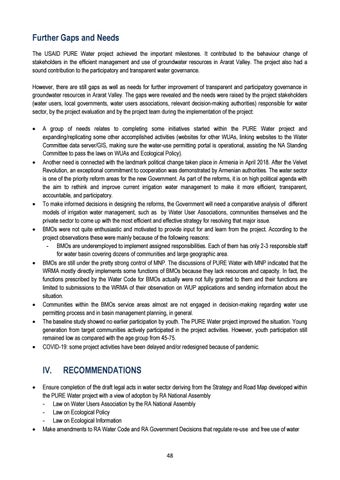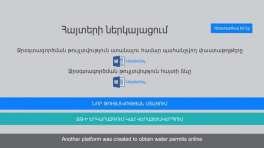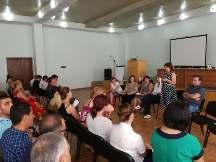Further Gaps and Needs The USAID PURE Water project achieved the important milestones. It contributed to the behaviour change of stakeholders in the efficient management and use of groundwater resources in Ararat Valley. The project also had a sound contribution to the participatory and transparent water governance. However, there are still gaps as well as needs for further improvement of transparent and participatory governance in groundwater resources in Ararat Valley. The gaps were revealed and the needs were raised by the project stakeholders (water users, local governments, water users associations, relevant decision-making authorities) responsible for water sector, by the project evaluation and by the project team during the implementation of the project:
A group of needs relates to completing some initiatives started within the PURE Water project and expanding/replicating some other accomplished activities (websites for other WUAs, linking websites to the Water Committee data server/GIS, making sure the water-use permitting portal is operational, assisting the NA Standing Committee to pass the laws on WUAs and Ecological Policy). Another need is connected with the landmark political change taken place in Armenia in April 2018. After the Velvet Revolution, an exceptional commitment to cooperation was demonstrated by Armenian authorities. The water sector is one of the priority reform areas for the new Government. As part of the reforms, it is on high political agenda with the aim to rethink and improve current irrigation water management to make it more efficient, transparent, accountable, and participatory. To make informed decisions in designing the reforms, the Government will need a comparative analysis of different models of irrigation water management, such as by Water User Associations, communities themselves and the private sector to come up with the most efficient and effective strategy for resolving that major issue. BMOs were not quite enthusiastic and motivated to provide input for and learn from the project. According to the project observations these were mainly because of the following reasons: - BMOs are underemployed to implement assigned responsibilities. Each of them has only 2-3 responsible staff for water basin covering dozens of communities and large geographic area. BMOs are still under the pretty strong control of MNP. The discussions of PURE Water with MNP indicated that the WRMA mostly directly implements some functions of BMOs because they lack resources and capacity. In fact, the functions prescribed by the Water Code for BMOs actually were not fully granted to them and their functions are limited to submissions to the WRMA of their observation on WUP applications and sending information about the situation. Communities within the BMOs service areas almost are not engaged in decision-making regarding water use permitting process and in basin management planning, in general. The baseline study showed no earlier participation by youth. The PURE Water project improved the situation. Young generation from target communities actively participated in the project activities. However, youth participation still remained low as compared with the age group from 45-75. COVID-19: some project activities have been delayed and/or redesigned because of pandemic.
IV.
RECOMMENDATIONS
Ensure completion of the draft legal acts in water sector deriving from the Strategy and Road Map developed within the PURE Water project with a view of adoption by RA National Assembly - Law on Water Users Association by the RA National Assembly - Law on Ecological Policy - Law on Ecological Information Make amendments to RA Water Code and RA Government Decisions that regulate re-use and free use of water
48





